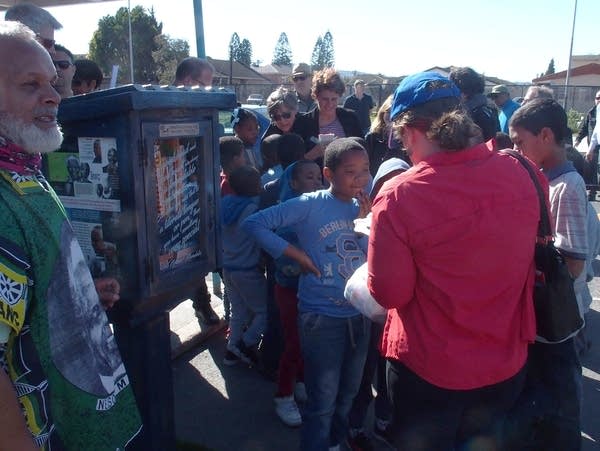Music brings together Minnesota Orchestra musicians, South African students

Go Deeper.
Create an account or log in to save stories.
Like this?
Thanks for liking this story! We have added it to a list of your favorite stories.
It may have been Saturday morning, but hundreds of students, teachers and parents crammed into the Eurocon Primary School in Elsies River — just outside Cape Town, South Africa — to welcome members of the Minnesota Orchestra.
The orchestra's two-week tour is taking the musicians to a total of five cities before its done. On Friday night, the players performed to a packed house at Cape Town City Hall. Yet they played just as seriously Saturday for the grade-schoolers and their families in the hard-worn but carefully tended concrete building miles from the bright lights.
Outreach has become a regular part of Minnesota Orchestra tours. It's no secret in the classical world that if their art is going to survive and thrive, current players and fans must cultivate the musicians and audiences of the future.
But the Elsies River visit went further than that. Many in the crowd had never heard classical music before, much less attended a concert.
Turn Up Your Support
MPR News helps you turn down the noise and build shared understanding. Turn up your support for this public resource and keep trusted journalism accessible to all.

Under the apartheid regime that ruled South Africa for much of the second half of the 20th century, classical music was considered something for the nation's white elite.
Apartheid may be gone, but in South Africa the classical audience is still predominantly white. The Minnesota Orchestra is working to change that a little, by playing to diverse audiences and incorporating new music into their performances. So far they have been warmly received — and it was no different at Eurocon Primary School.
After being greeted with a rousing song in the courtyard from the primary school's choir, the Minnesota musicians split into small groups to explain how their instruments work, and then play a little. First a string quartet, followed by a woodwind quintet, and then the brass quintet.
As the musicians stood on stage at the end of a long, narrow building, it was standing room only all the way to the back as hundreds of students, teachers, and family members jammed in to listen.

The youngsters howled with laughter as the reed players demonstrated the quacking sound of their mouthpieces, but they really loved it when musician Steven Campbell demonstrated how low his tuba could go. The building seemed to shake as he pretended to collapse under the effort, and then it rang with laughter.
Yet when the music started in earnest, everyone just sat and listened. Yes, a baby cried here, and a couple of preschool boys wrestled a little there. But by and large they just seemed to be letting the sound wash over them.
Eurocon Principal Frank Agulhas noticed it, too. When it was pointed out that a similar group of youngsters in the U.S. likely would have been far less attentive, he proposed another explanation.
"Maybe... being surrounded by a lot of Americans surprised them," he said.

While an outreach stop had been on the tour schedule for this day for ages, that it happened at Eurocon was a surprise. The plan was to go to a nearby high school. But when recent circumstances prevented that from happening, representatives from 29:11, a local gospel group which has been acting as an outreach liaison for the orchestra, approached Eurocon to see if it would host an unexpected visit.
Despite only a few days' notice, Agulhas was game.
"Our community needs this kind of thing to teach them about other cultures and musical instruments, and music," he said.
After the Minnesotans played, it was then back out into the school courtyard for dances by local women, and performances by local singers, including 29:11. The group's members have just returned from Minnesota, where they toured for four months and worked to help prepare the Minnesota Orchestra and Chorale for their journey to Africa.

Co-founder Brendon Adams grew up in Elsies River, and he impressed on everyone what a big deal it was to have what he called the best orchestra in the world come to their school.
"They chose to come to OUR community," he told the group.
Then there was more dancing, including a huge circle dance for women and children. Some female members of the orchestral group joined in, too.
Finally, the community shared a huge pot of chicken and rice. It was so big, and there were so many people, it took ages to serve.

Everyone looked satisfied.
"It was a learning experience for me, too," said Agulhas, saying he had never before heard a classical music performance. As buses took the orchestra members off to the airport and their next tour stop in Durban, everyone seemed to think this was a Saturday well spent.


